Life in lockdown for Australians around the world
From a love story in Barcelona to a dangerous adventure on the high seas, Aussies overseas reveal how they are surviving the COVID-19 lockdown.
Australians have found themselves stranded and facing extraordinary circumstances all over the world.
From a love story to a dangerous adventure on the high seas, they have shared their stories of surviving the COVID-19 lockdown.
GALAPAGOS ISLANDS
Five Aussies are risking their lives sailing a small private yacht thousands of nautical miles across the world in a bid to get home, after being stranded in the Galápagos Islands.
All of them are sleeping in a shared space the size of an average bathroom and taking three -hour watches each, as they sail as fast as possible to the nearest port at Pape’ete in Tahiti in the hope they will be allowed to dock there.
They are fishing as they go to supplement their food supplies and they have celebrated some milestones with freshly-baked pineapple and carrot cake.
Doug Cuming, his son Hugo and his girlfriend Tara Murphy, journalist Cathy Hawkins and their friend Marie van der Gumster had taken off on the adventure of a lifetime at the beginning of March, sailing the 40ft aluminium yacht Passepartout (French for goes everywhere) through the Panama Canal to the Galapagos, with the plan to then fly home.
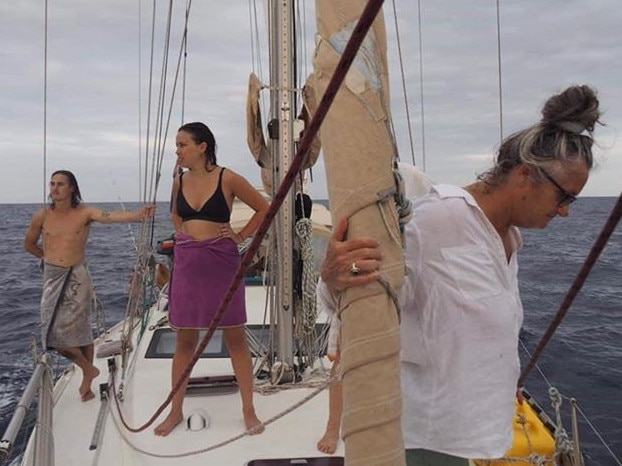
But with the world suddenly thrown into chaos by COVID-19, they arrived to find Ecuador had shut its borders. They couldn’t stay or get a plane out. Their only option was to set sail and find another country to let them in.
Now they are more than halfway to Tahiti, after three weeks in the open ocean. They have another four days’ sailing but are unsure of the reception that awaits them – whether it will be military and guns – or if they will be allowed to stay.
Tara’s father Tony Murphy said DFAT has elevated their situation to emergency and has tried to help by arranging seats on the last charter plane out of Tahiti to Hawaii, in the hope they can get a repatriation flight to Australia from there. But despite their best efforts, with light winds and low on fuel, it appears they will miss it by a day.
If they can’t stay they face another two weeks sailing on to Fiji. From there if they still can’t get flights it will be five to six weeks of sailing to New Zealand then two weeks further to Australia.
BARCELONA-SPAIN
Australian man Ricardo Amare had known his Spanish girlfriend Maria Canadas for just one month when Barcelona went into lockdown.
Their friends said they were mad to do it together after only just having met, but Ricardo said it has been a wonderful time spent falling further in love.

“In this apocalyptic time, we are appreciating the small things and focusing on doing the things we love,” said Mr Amare.
“We are cooking, reading beautiful books, and learning about each other.”
Mr Amare who has a creative agency No Comment Media arrived in Barcelona to spend a year opening a new branch of his business and travelling the country.
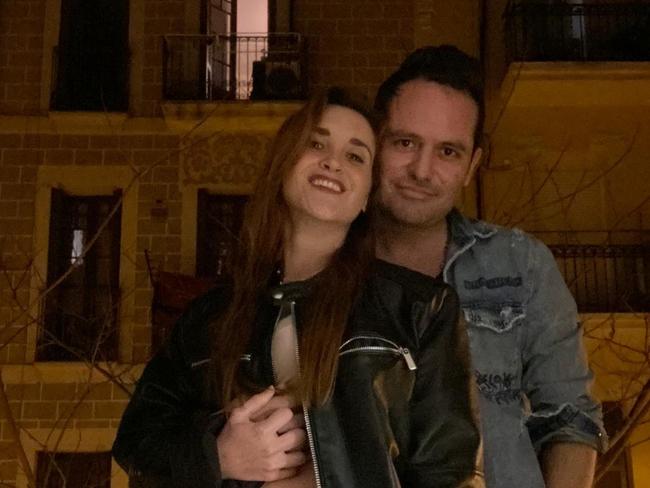
They have cancelled their travel plans to Granada and Morocco and are confined to their apartment which luckily has a beautiful terrace overlooking Poble Sec, a historic neighbourhood famous for its tree-lined squares, elegant architecture, tapas bars, and home to artists and theatres.
Summer is coming in Spain and Mr Amare is hopeful that in the future he will look back on this unprecedented time, as precious moments.

LOMBARDY – ITALY
Aussie John Carey is in the town of Bergamo, the epicentre of what is – so far – the world’s deadliest coronavirus outbreak.
It’s the hardest hit city in Lombardy, which is by a long way, the worst affected region of Italy, with a death toll nearing 10,000.
Shopping is his once-a-week adventure, as Mr Carey’s work has completely dried up.
So he is focusing on feeding his partner Alex, an English teacher, who continues to deliver daily lessons online from their bedroom.
“I like cooking. Luckily. With little else useful to do, I seek recipes that are time consuming. The more prep they need, the better …” he said.
Afternoons pass quickly, checking various news websites, streaming news radio and
watching Italian television news to keep up with coronavirus developments.
After dinner, it’s time to decide what to watch before bed. The internet is fast there, so
Netflix, Amazon Prime and Now TV all work well.
But Mr Carey said the silence at night is eerie.
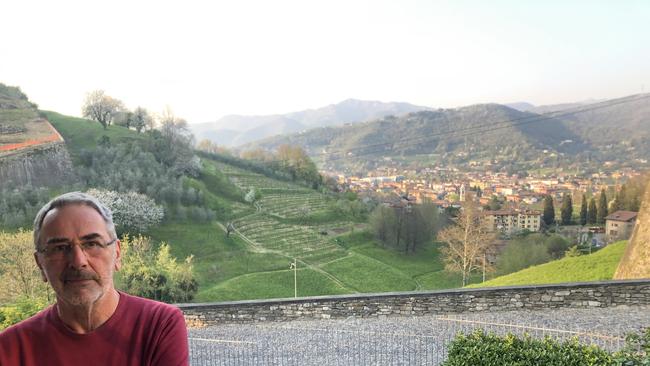
“It’s like being deep in the bush, not a heavily populated region not far from Milan.”
He said his partner does the shopping run to the closest supermarket, around one kilometre away.
“There’s always a well-spaced queue outside. She loads our scooter to the max with
stuff like dried beans, laundry powder, toothpaste, cat food and vino.
“Unlike Australia there’s always toilet paper on the shelves. What has run out is flour.
When Italians are told to stay at home, they worry about being unable to make pasta, not wiping their behinds, it seems.”
Mr Carey said he covers their other shopping needs, lining up in the groups outside the local bakery, butchery and the fruit and veg vendor.
He said mask-wearing was made compulsory outside the house a week ago, so everyone is wearing them.
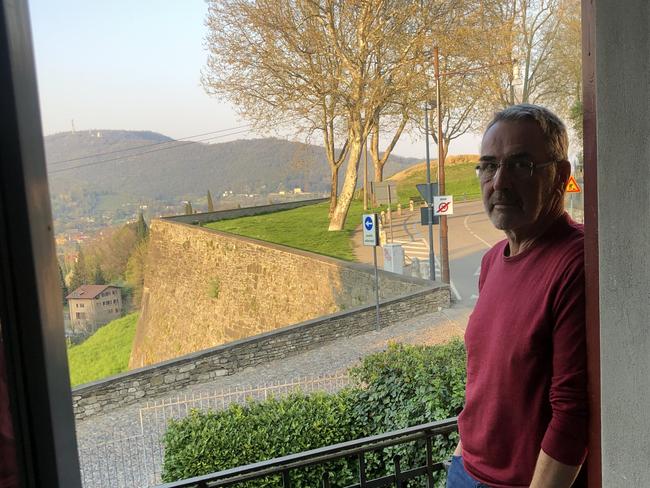
He said Bergamaschi – as the people of Bergamo are known – realise a desperate battle is being fought by doctors, nurses and other health care workers in the hospitals and the observance of the strict social isolation rules is widespread.
While the social distancing recommendation there is one metre, he said people are more comfortable if you at least double it.
“It’s not hard to understand why. It’s not only coronavirus-fighting doctors and nurses who are dying by the dozen, the disease is also killing providers of essential services; cops, postal workers, supermarket checkout operators, and undertakers.”
But he sees none of that from the balcony of their small apartment.
“We’re fortunate to have a view. Beyond the walls of Bergamo’s Città Alta I can, most days, watch two Italian farmers tending their vines and olive trees beneath the clear and quiet sky of the saddest spring I’ve ever known …”
SHANGHAI – CHINA
Hundreds of colourful share bikes are cluttering the pavements and delivery men are carrying parcels to the doors of apartments.
Paul LePetit, a retired journalist turned cultural consultant and teacher, said people are starting to use public transport again and go to work and offices as Shanghai slowly comes back to life after months of lockdown.
He and his wife Huang Jie, who have lived in China for 13 years, said most bars, shops and restaurants are open again, and now there’s no one taking temperatures at the front door.
Mr LePetit said unlike Australia, Shanghai did not mandate personal distancing.
There was little need, he said, because everyone stayed home unless they were out buying food – instant noodles had a boom season – or buying medicine.
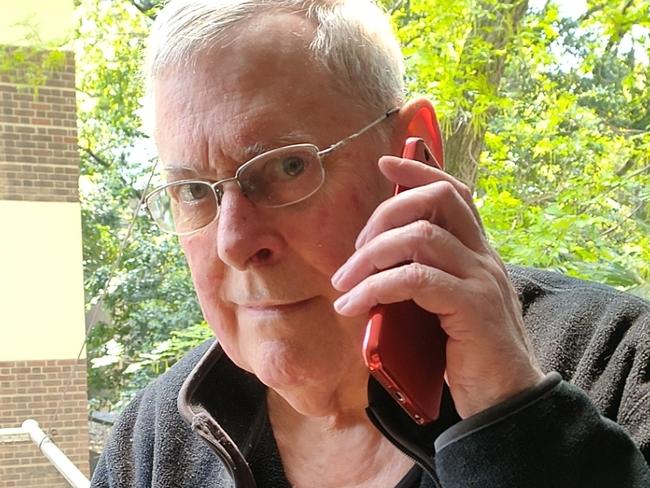
“You no longer have to fill in a form with your personal details, giving your address and phone number. Instead, China has introduced a Health Code app, which you download to your phone,” he said.
“This app tracks your movements to determine if you are a risk to the community. New returnees must stay in self-quarantine in their apartments for 14 days, waiting for their code to go from Red to Green. After that, you may be asked to show your Green Code when entering apartment buildings, offices, and other public spaces.”
“Another kind of green has become important and more prevalent: spring leaves, which are appearing on the trees around my apartment. I see more people outside, walking around in the sunshine. It is almost like the busy old Shanghai with its cheerful busting hordes.
“Except that everyone now wears a mask. Confidence is growing but there are concerns about new, imported cases, and it may be that Shanghai will not be mask-free city for a long time yet.
